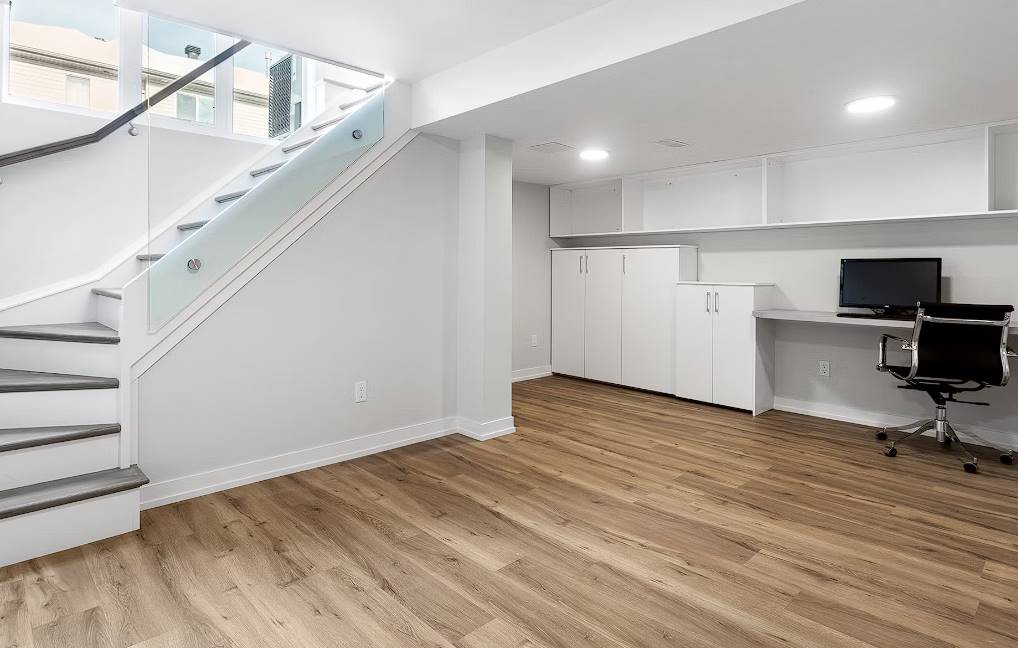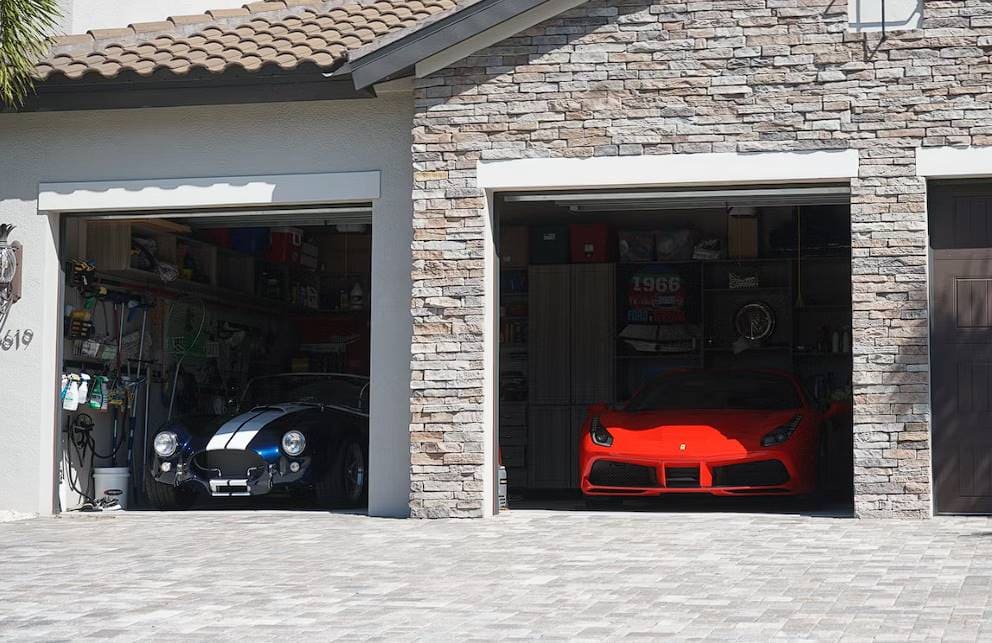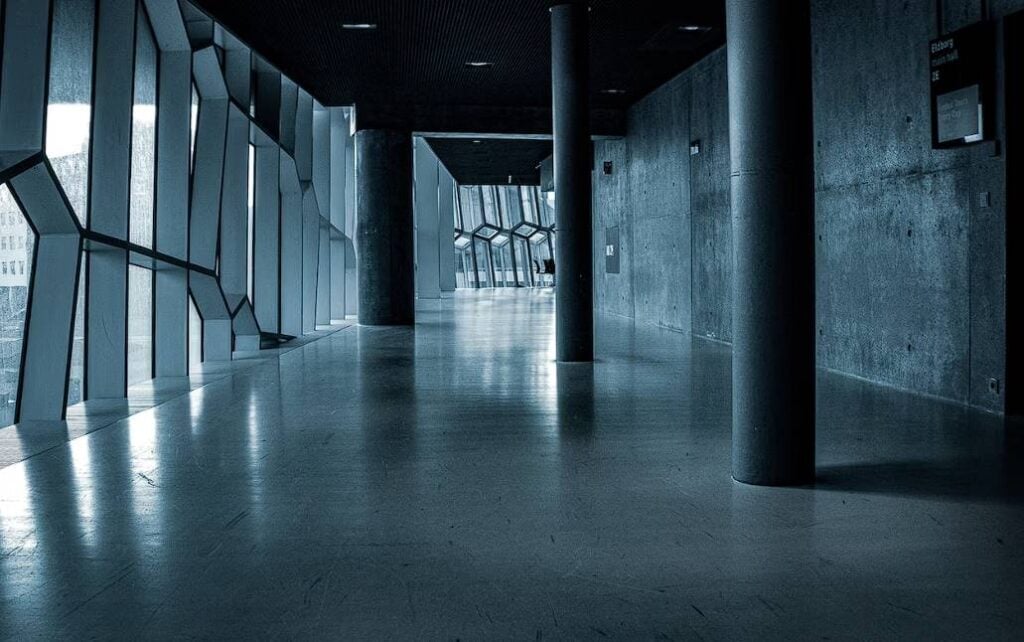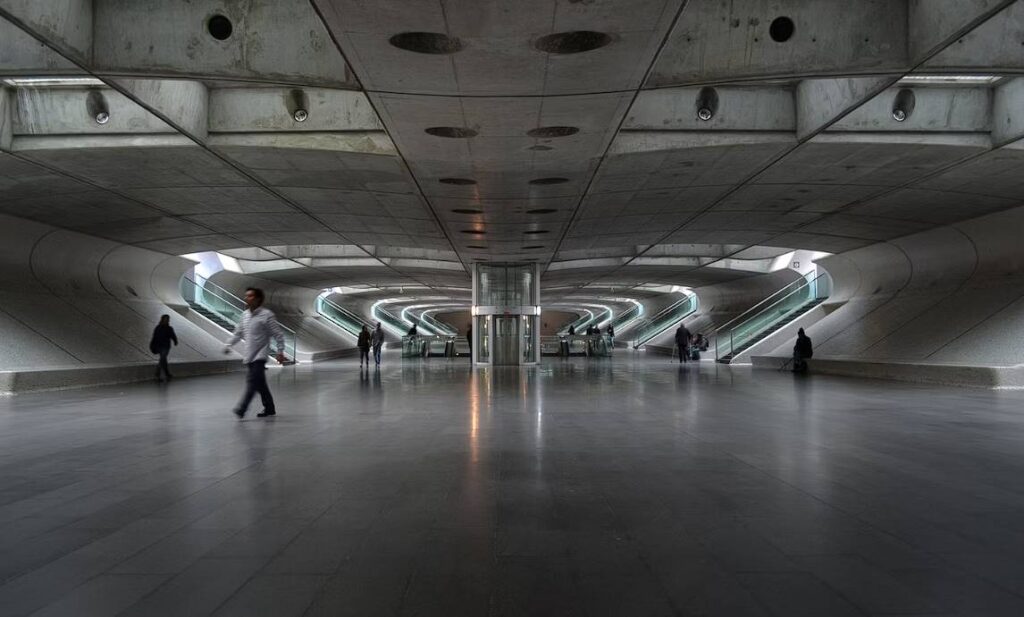When considering ways to enhance the value of your home, the garage may not be the first area that comes to mind, especially if its primary function is storage and workspace. Typically, the focus in garages is on functionality rather than aesthetics. However, having a finished garage can set your home apart and leave a lasting impression on potential buyers. The question then arises: does a finished garage genuinely increase the value of your home? The answer depends on your objectives and the target audience you aim to attract.
When guests arrive at a vacation rental, they expect a high-quality standard throughout the property. Discovering a finished garage that serves as additional living or workspace can be a delightful surprise. According to one of Ontario's leading home builders, a finished garage can generate as much additional income as an extra bedroom.
You may have spent countless hours browsing Pinterest, admiring images of custom-designed garages. As the initial excitement subsides, you're ready to consider the financial aspect.
It's important to note that a finished garage will not directly impact your home's appraisal value. However, it can create a "wow" factor among potential buyers, leading to a shorter time on the market. While the monetary value may not be quantifiable in appraisal terms, your home's enhanced appeal and marketability can attract more interested buyers and potentially lead to a quicker sale.
What is a Finished Garage?
Depending on the architectural style of your house, a garage may or may not be considered "completed." But for the sake of convenience, below is a broad classification of modern dwellings.
A finished garage needs to have the same finishes as the rest of your house. This necessitates concealing any piping, beams, studs, or wiring that might be on display. If the interior of your home is finished with drywall, that style should be carried into the garage as well.
Garage door replacement is a simple way to increase a home's value, and you can usually recuperate a good chunk of the door's cost when selling the house.
Consider installing insulation, air conditioning, or heating in the garage, depending on the weather where you live.
Finished garage flooring options include tile, epoxy, and even concrete. The secret is to waterproof the garage floor to prevent water damage.
There must be adequate ventilation and illumination. Adding proper lighting and positioning fans can greatly improve the area's liveability and aesthetic appeal.
A property with a rustic cabin or industrial architectural theme can benefit from having exposed rafters and ducting. It is possible to consider the garage "finished" even if it lacks the finishing touches found in the living quarters or kitchen.
In What Ways May a Finished Garage Increase the Value of a Home?
If your primary objective is to maximise your home's appraisal value, investing in a finished garage may provide a small return. Other renovation projects are likely to have a more significant impact on the overall appraisal value of your property.
However, a finished garage can be a valuable selling point if you intend to sell your home shortly. Potential buyers often seek homes with desirable features, and a well-finished garage is often on their checklist.
It's important to note that many homeowners prefer a traditional garage space rather than one converted into another type of room, such as a bedroom.
The "Wow Factor" of a Finished Garage
Although a finished garage may not directly contribute to the appraisal value of a home, it can play a significant role in attracting potential buyers and making the property more appealing. A well-finished garage sets the home apart from others on the market and can be particularly attractive to buyers who enjoy DIY projects or value additional usable space.
The value of a finished garage is subjective and largely depends on the preferences of the individual buyer. A finished garage can be a valuable selling point for the right buyer who appreciates the added convenience and potential for customisation. It can create a positive impression and lead to a quicker sale.
Considering the Cost of a Finished Garage
Compared to renovating other rooms in a house, finishing a garage is generally more affordable. However, it still comes with its costs. Completing a garage can require a budget of around $10,000, which is considered a significant expense.
Determining whether the investment was worthwhile is subjective and depends on the buyer's evaluations and priorities. Some buyers may see the added value in having a finished garage that aligns with their needs and preferences. Others may place less importance on a finished garage and may prioritise investments in other areas of the home. Ultimately, the decision on whether the cost is justified is personal for the buyer to make.
Why Finishing Is Better Than Converting
Finishing a garage can add more value to a home than simply converting it. This is because a finished garage blends in seamlessly with the rest of the house, giving it a cohesive and polished appearance. In contrast, a converted garage often appears as an add-on or an afterthought, which may be less appealing to potential buyers.
A completed garage that meets or exceeds expectations can be a positive asset for a home. However, if a garage is up to standard, it can positively impact the overall appraisal value of the property.
A full garage also gives you more options for how you can use it. Most garages that have been turned into something else are made for a specific use, like a home gym or office. This can be helpful if the space's planned use fits the buyer's needs, but it limits the space's flexibility if those needs change in the future.
In contrast, a finished garage can be utilised for various purposes based on the homeowner's preferences and evolving needs. It can serve as a playroom for children, a functional home office, a dedicated relaxation area like a man cave, or even be converted into an extra bedroom.
Ultimately, a finished garage provides both aesthetic appeal and functional flexibility, making it a desirable feature that can positively impact the overall value of a home.
A Middle Ground for Your Garage
Finding a balance between fully renovating your garage and preparing your house for sale is possible. You can enhance the appearance of your garage without incurring additional costs by thoroughly cleaning it, organising the space effectively, and addressing any noticeable maintenance issues. These simple steps can give your garage a fresh and attractive look without requiring a significant financial investment.
Advantages and Disadvantages of Garage Conversion
Garage conversions require careful consideration as the pros and cons are less balanced than in the case of remodelling a basement. Remodelling a basement is generally a safe bet, as it involves transforming a dark and unused space into a functional and well-lit area.
However, converting a garage is a different story. By converting a garage, you are trading versatile space that can be used for various purposes for a space limited to one specific use, such as a living space.
In some cases, converting a garage can even devalue your house. While it may save yard space, it also means sacrificing yard space that could be utilised for other activities. Although converting the garage is a good idea since many people use it for storage, potential buyers often value homes with intact garage spaces more highly. Therefore, the value of the home can decrease with a garage conversion.
Furthermore, garage conversions can be more complex and costly than they initially appear. While it may seem straightforward since the structure is already in place, garage conversions are extensive projects that can require a significant investment.
Ultimately, deciding between finishing or converting a garage depends on your needs and preferences.
Follow These Three Tips if You Want to Turn Your Garage Into a Room.
Now that you have considered the advantages and disadvantages, let's provide some helpful tips to assist you in making your decision more straightforward:
- Converting your garage is a substantial investment that requires careful consideration. It is essential to clearly understand how you intend to use the space and the specific design and layout you envision. Set a realistic budget that includes room for unexpected expenses, and consider consulting with a knowledgeable contractor who can help bring your vision to fruition. Their expertise will be invaluable in ensuring a successful garage conversion project.
- When planning your garage conversion, including the cost of removing the garage door in your budget is essential. This step can be expensive and involves removing the hardware, replacing the door with appropriate alternatives, and potentially adding windows if desired. Additionally, attention must be given to the finishing touches from the exterior perspective to ensure a cohesive and aesthetically pleasing look. Be sure to allocate funds for these expenses to avoid surprises or budget constraints during the conversion process.
- Due to their typical lack of natural light and insulation, garages require careful consideration regarding lighting, heating, insulation, and air conditioning. When converting a garage into a livable space, addressing these aspects is essential to ensure a comfortable and functional environment.
- Lighting is crucial to overcome the lack of natural light in a garage. You may need to plan for additional light fixtures, including overhead lights, task lighting, and possibly even skylights or windows, to bring in natural light. Since garages are usually not insulated, it's essential to assess the insulation needs of the space. This may involve adding insulation to the walls, ceiling, and floor to improve energy efficiency and regulate temperatures. To reach the converted space, heating and air conditioning systems must be extended or modified. This could involve extending ductwork or considering alternative heating and cooling options such as mini-split or radiant floor heating.
Finishing VS Converting a Garage
It's up to you to decide whether or not you need to finish your garage or turn it into a living area. When space becomes limited, homeowners may consider garage conversions to create additional usable space. This is especially common in areas where properties are close together, and real estate prices are high. Furthermore, the availability of online platforms has made it easier for homeowners to offset mortgage costs by renting out unused spaces like garages.
Garage conversions are ideal DIY home remodelling projects since they often don't involve heavy lifting or significant structural changes. However, it's essential to carefully weigh the pros and cons before embarking on such a project.
Some of the advantages of a garage conversion include maximising the use of existing space, increasing the property's value, and generating rental income. Converting a garage can provide additional living space that can be used for various purposes, such as an extra bedroom, home office, or recreational area.
However, it's essential to consider the potential drawbacks as well. Garage conversions may require significant planning, cost, and construction work, including addressing lighting, insulation, heating, and plumbing requirements. It's crucial to adhere to local building codes and obtain any necessary permits. Additionally, converting a garage means losing the space for its original purpose, such as vehicle parking or storage, which could impact the convenience and functionality of the property.
Before starting a garage conversion project, it's advisable to thoroughly evaluate the feasibility, costs, and potential impact on your property's value and functionality. Seeking guidance from professionals, such as contractors or architects, can provide valuable insights and ensure that the project aligns with your goals and meets all requirements.
Get help from a professional before you do anything.
Consulting a local real estate agent is a valuable step in determining whether a finished garage will increase the value of your home in your specific neighbourhood. Experienced real estate agents know buyer trends and popular home renovations within your area and price range. They can provide insights based on their expertise and help you make an informed decision.
In some cases, having a finished garage can be a valuable asset, even if it's different from the norm in your area. It can set your home apart from the competition and be an attractive feature for potential buyers. Highlighting the finished garage in your marketing materials can generate interest and draw buyers to your property.
While the market for homes with finished garages may be relatively small, there could be niche buyers who place a higher value on this feature. For instance, a hobbyist needing a workshop or a car enthusiast looking for a well-maintained vehicle space might be willing to pay more for a finished garage.
However, a local real estate professional may advise against investing in a finished garage if it's not expected or highly valued in your area. Their advice could save you a significant amount of money.
Ultimately, consulting with a local real estate agent will provide personalised guidance and help you weigh the potential benefits and costs of finishing your garage about the specific market conditions in your neighbourhood.
Conclusion
The most critical information is that a finished garage is a selling point and makes an impression on prospective buyers. Despite the fact that a finished garage has no bearing on the home's appraisal value, it can increase interest from purchasers and reduce the property's time on the market. The garage, like the rest of the house, should have its structural elements (such pipes, beams, studs, and wiring) concealed. Tile, epoxy, and concrete are all viable options for a finished garage floor, with waterproofing being the key to avoiding water damage. Adding lights and placing fans in the right spots can do wonders for the comfort and aesthetics of the space.
The worth of a finished garage is relative to the purchaser's preferences and assessments. For the right buyer, who values ease of use and adaptability, this feature can be a major selling factor, resulting in a more favourable first impression and a more rapid closing. Although finishing a garage is typically less expensive than upgrading other rooms in a home, it still isn't free. Rather than just converting it, finishing a garage can increase a home's resale value. Having a finished garage is an added bonus that can raise a home's selling price.
It's an attractive addition that can boost a home's value because of the value it adds in terms of both aesthetics and practicality. The benefits and drawbacks of converting a garage are not as evenly weighted as they would be in the case of upgrading a basement. Although converting a garage can help you save on yard space, it will also take up valuable room that you could be used for anything else. Converting a garage may be a costly task, so planning ahead is essential. Consider seeking the advice of an experienced contractor and factoring in the expense of garage door removal.
The comfort and efficiency of a space depend on its lighting, heating, insulation, and air conditioning. The lack of windows in a garage necessitates the installation of artificial lighting, while the necessity for better insulation and temperature control necessitates an evaluation of the current situation. Heating and cooling systems will need to be either extended or redesigned to service the new area. Garage conversions are great do-it-yourself home improvement projects, but you should think carefully about the benefits and drawbacks before you start work. Increased rental income, a higher property value, and better utilisation of existing space are all benefits.
However, it's crucial to follow local building rules and acquire any necessary licences before repurposing a room. Assessing the project's viability, expenses, and potential impact on the value and functionality of the property should precede any garage conversion work. A local real estate agent is a great resource for learning whether or not finishing your garage will add value to your property in your area. Having a finished garage is a nice perk for potential buyers, but if it's not something that's common or highly regarded in your area, a real estate agent may advise against making the investment.
Content Summary
- Finishing a garage can enhance the value of your home, even though it may not be the first area that comes to mind for improvement.
- A finished garage can leave a lasting impression on potential buyers and set your home apart from others on the market.
- Ontario's leading home builders suggest that a finished garage can generate as much additional income as an extra bedroom.
- While a finished garage may not directly impact the home's appraisal value, it can create a "wow" factor among potential buyers.
- The enhanced appeal and marketability of a finished garage can attract more interested buyers and potentially lead to a quicker sale.
- A finished garage needs to have the same finishes as the rest of the house, concealing any exposed piping, beams, studs, or wiring.
- Garage door replacement is a simple way to increase a home's value.
- Installing insulation, air conditioning, or heating in the garage can improve its functionality and appeal.
- Tile, epoxy, and concrete are options for finished garage flooring, with waterproofing being essential.
- Adequate ventilation and illumination are necessary for a finished garage to enhance livability and aesthetic appeal.
- The architectural theme of a property can influence the finishing touches of a garage, such as exposed rafters and ducting.
- A finished garage may provide a small return in maximising the home's appraisal value, but it can be a valuable selling point for potential buyers.
- Many homeowners prefer a traditional garage space rather than one converted into another type of room, such as a bedroom.
- A well-finished garage can attract potential buyers who enjoy DIY projects or value additional usable space.
- The value of a finished garage is subjective and depends on the preferences of the individual buyer.
- Finishing a garage is generally more affordable than renovating other rooms in a house.
- The decision on whether the cost of finishing a garage is justified depends on the buyer's evaluations and priorities.
- Finishing a garage is better than converting it because it blends in seamlessly with the rest of the house and provides a cohesive appearance.
- A finished garage offers more flexibility in usage compared to a converted garage that is limited to a specific purpose.
- A finished garage can be utilised as a playroom, home office, relaxation area, or extra bedroom based on the homeowner's preferences.
- A finished garage provides both aesthetic appeal and functional flexibility, positively impacting the overall value of a home.
- Cleaning, organising, and addressing maintenance issues can enhance the appearance of a garage without significant financial investment.
- Garage conversions require careful consideration, as the pros and cons may be less balanced compared to remodelling a basement.
- Converting a garage can limit the space to one specific use and potentially devalue the house.
- Garage conversions can be complex, costly projects that require a significant investment.
- Tips for turning a garage into a room include careful planning, setting a realistic budget, and consulting a knowledgeable contractor.
- Removing the garage door and addressing exterior finishing are important considerations in garage conversions.
- Lighting, insulation, heating, and air conditioning must be addressed when converting a garage into a livable space.
- The decision to finish or convert a garage depends on individual needs and preferences.
- Consulting a local real estate agent can provide valuable insights into the potential impact of a finished garage on the home's value and marketability in your specific area.
Frequently Asked Questions
While different elements, like the size and features of the detached garage, change the resale value of your home, nationally speaking, a homeowner can stand to recoup 65% of their investment by adding a garage.
With an attached garage, your space is limited and primarily dictated by the existing house space. The detached garage allows you more freedom to build, expand and re-imagine. It allows more room for landscaping.
An unfinished garage is your average garage--stuff stored all around, unfinished walls and ceilings, and very few creature comforts. A finished garage looks more like any other room in the home, with a clean, put-together look and plenty of open space.
Plywood Garage Walls are helpful for garage and storage spaces where homeowners frequently hang their tools, shelves, trophies, machinery etc. Due to the extra strength provided by plywood, there is high resistance to dents and damage, which plagues drywall.
Repaint your garage and make it white. Another trick in making your garage look bigger is by repainting it white. Dark colours are said to absorb light that makes your garage look smaller.







